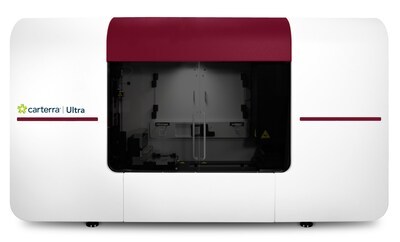
The new instrument enables high-throughput small and large molecule characterization in traditional and AI-driven workflows
SALT LAKE CITY,Sept. 4,2024 --Carterra Inc.,the world leader in innovative technologies enabling high-throughput biology,today has launched Carterra Ultra™—the latest addition to its LSA®and LSAXT label-free high-throughput surface plasmon resonance (HT-SPR) instruments. The Ultra platform enables small molecule applications with the same high throughput,rapid data collection,and low sample volume as Carterra's first two systems while also delivering the utmost sensitivityto characterize moleculesas small as 100 Daltons.

The new Carterra Ultra™ HT-SPR instrument for small molecules and fragments
Ultra boasts enhanced optics,advanced microfluidics,and thermals capable of high-sensitivity measurements in an array-based format with signal-to-noise optimized for Fragment-Based Lead Discovery (FBLD). With its rigorous thermal control,Ultra canmeasure interactions down to 10°C,five degrees lower than its LSA and LSAXT counterparts.
"During our testing of the Carterra Ultra,we were able to screen a vast array of molecular interactions in parallel. We're excited about this revolutionary new SPR platform as it will rapidly accelerate aspects of the drug discovery process by utilizing high-sensitivity biophysical characterization with unparalleled throughput," said Phillip Schwartz,Ph.D.,a drug discovery industry leader in San Francisco. "This marks a significant advancement in the field,as the technology allows us to screen a larger population of relevant protein targets and variants enabling us to move much faster in our efforts to create new medicines and improve human health."
The Ultra platform is also a game changer in artificial intelligence and machine learning (AI/ML)-based approaches which need massive amounts of binding data to train and validate large language AI models. With the industry focus on the role of AI in enhancing drug discovery,the Ultra offers a way for scientists to carry out a deeper interrogation of multiplexed binding interactions and in the emerging application of ligandability,a workflow allowing biopharma to scan their existing disease targets for new indications.
Asked what he is most excited about with the introduction of the Ultra to the market,Carterra CEO,Josh Eckman,said "We know when it comes to life-saving medicines,time is of the essence. The Ultra is the next step in increasing the speed with which new small-molecule drugs can be discovered. The multiplex SPR format with minimal sample use relative to other label-free platforms will allow scientists to generate high-resolution data that yields faster and earlier decision making."
The Ultra will make its public debutin the U.S. at the Fragment-Based Lead Discovery conference in Boston,MA taking place September 22-25,2024,and in Europe at ELRIG's Drug Discovery in London,October 2-3,2024.
Media Contact:
Cheri Salazar
(408) 594-9400
About Carterra,Inc.
Carterra® is a leading provider of innovative technologies designed to accelerate the discovery of novel therapeutic candidates. Carterra's high throughput LSA,LSAXT,and Ultra platforms for monoclonal antibody (mAb) and small molecule screening and characterization combine patented microfluidics technology with real-time High-Throughput Surface Plasmon Resonance (HT-SPR) and industry-leading analysis and visualization software. These systems deliver up to 100 times the throughput in 10% of the time while using only 1% of the sample compared to existing label-free platforms. The LSAXT and Ultra instruments introduce enhancements to Carterra's flagship product,the LSA,increasing sensitivity and enabling new applications in biotherapeutic discovery and small molecule analysis.